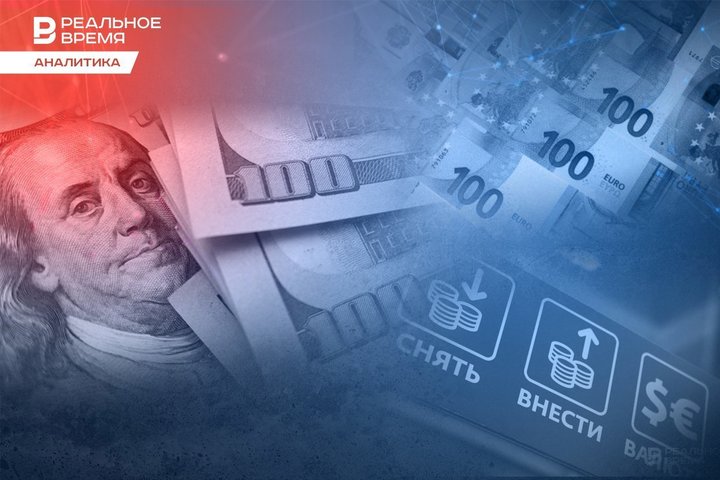Black Thursday for Moscow Stock Exchange: we expect panic, stock market drawdown and inflation
Another sanctions against Russia have put the stock exchange trading in dollars and euros on hold

On June 12, Russia Day, the country received another “gift” in the form of sanctions against the Moscow Exchange, the National Clearing Center, and the National Settlement Depository. Starting June 13, trading in dollars and euros on the stock exchange has been stopped, but will continue to be carried out on the over-the-counter market, the Central Bank of Russia reassures. Despite this, huge queues lined up in exchangers in a number of cities the day before, and some banks raised the dollar sale rate to 200 rubles. Is there any reason to panic and how the Russian foreign exchange market will change — in the review of Realnoe Vremya.
Authorities were ready for such a turn of events
The Bank of Russia, literally immediately after the announcement of the news by the US Treasury about the imposed sanctions, issued a statement that transactions with the US dollar and euro will continue to be made at the over-the-counter level. Citizens will have the opportunity to buy and sell currency through banks.
The Central Bank will determine the official exchange rates to the ruble based on bank statements and information from digital platforms for over-the-counter trading. Funds in the accounts and deposits of citizens and companies remain safe, the Central Bank of Russia stated in a press release.
“Deposits and accounts of citizens and organisations in US dollars and euros remain in the same mode of disbursement of funds established by the Bank of Russia," the regulator assured.
In St. Petersburg, huge queues lined up at the exchangers the day before. Everything is as usual with us," the Kazan Bank commented on the situation. “We sell and buy. Everything is calm, in working order.”
People are experiencing the first shock
“As you know, there is a particularly sensitive public in the cultural capital," says Maxim Osadchy, the head of the analytical department at BKF Bank. “There is no information about queues at the exchange offices in Moscow and other Russian cities. However, when banks with reduced social responsibility set the dollar selling rate at 130, 150 or even 200 rubles, this contributes to panic moods.”

There is no reason to say that now the authorities in Russia will somehow manipulate the dollar exchange rate: “After all, there is a reliable indicator — the yuan, which continues to trade on the Moscow Exchange. The dollar-ruble exchange rate is easily calculated using the dollar-yuan exchange rate on the international market and the yuan-ruble exchange rate on the Moscow Stock Exchange.”
“However, interventions in the yuan exchange market are not excluded. Also, in a critical situation, the regulator can assist banks by selling them cash currency," Osadchy does not exclude. “The Central Bank has accumulated a huge reserve of cash currency before its operation — about $40 billion.”
Foreign exchange market is becoming interbank
“For ordinary people who did not trade on the stock exchange themselves and whose funds did not hang there, there will be no noticeable consequences, because almost everything that is significant will happen behind the scenes — for example, a new mechanism for setting the Central Bank's exchange rate," says Anton Tabakh, chief economist at Expert RA, Associate Professor of Economics at Moscow State University. “Besides, all other things being equal, spreads for non-cash currency transactions will become wider. If before there was always an opportunity for a large transaction to go and buy currency directly on the stock exchange with penny commissions, now banks will have more opportunity to earn on various kinds of commissions for all currencies except the yuan. For the rest, the regime does not change, they have been preparing for sanctions for a long time. The fact that the Central Bank and the Moscow Exchange issued their statements and orders within an hour of the decisions of the US Treasury Department shows well that all documents were ready in advance. All that remained was to press the button.”

“Historically, since 1992, we have had an exchange-traded currency market. This is not the case in most countries of the world. It is rather interbank — now in Russia. I'm not saying that the sanctions imposed are nothing at all. But the scale of the consequences due to good preparation is likely to be minimal. The Central Bank has already announced that the exchange rate will remain market-based and it will be set based on an analysis of transactions, so we'll see how it goes from here," Anton Tabakh commented on the situation.
The shock is serious, but not a disaster
“The new sanctions against the Moscow Stock Exchange are a very serious shock, but not a “black swan” or a super disaster for the reason that such a possibility has been discussed for a year. Last autumn, the Central Bank already said how it would act in the event of such a situation," said financial expert, member of the RSPP Commission on Banks and Banking, PhD in Economics Yan Art.

“An important point is also that the cross-rate will be calculated through the yuan: there are ruble -yuan and yuan-dollar stock quotes, and our rate will be calculated through this story. It is often asked why not through the dirham, which is more tightly linked to the dollar, and not through the Hong Kong dollar? Today, the answer is already there: stock trading in the Hong Kong dollar in Russia has also been suspended. And the dirham is still a “backroom currency”, and the volume of trading operations with this currency is an order of magnitude lower than with the yuan," explains Art.
“It is quite natural that banks will maximise spreads for the sale and purchase of foreign currency. There are several reasons for this, and making money on panic is far from the most important of them, as it may seem to ordinary people," he says. “The most important reason is to invest in the extended spread of vagueness and ambiguity with the ruble exchange rate. Now I would warn everyone against panic actions, and yesterday I did it on my live broadcast. No action on Thursday! But of course, you can't stop people.”
The negative consequences of the new sanctions are a blow to the Moscow Stock Exchange, although not fatal, and a decline in the Russian stock market. “Exporters are no longer able to comply with the presidential decree on the sale of export earnings," Art says. “But the problem with importers is much more serious, because banks will offer them currency with a huge spread. Accordingly, one of the consequences of this story may be a jump in prices due to the rise in the cost of the import component. Besides, importers themselves are also likely to expand the margin of purchase and sale, and also not out of greed, as people would think, but in order to hide potential risks in the margin — uncertainty of the exchange rate. This is likely to push inflation up, but not at a catastrophic level.”
According to Yan Art, today in Russia it is urgently necessary to install an over-the-counter platform for currency exchange, where exporters would sell proceeds, fulfilling a presidential decree, and importers — buy currency directly. “Technically, the Central Bank can probably make such a platform. But here I am already stepping into not my sphere. I don't know how everything will be implemented in the end, but that's exactly what I would do," the expert argues.
“We expect a panic, a drawdown of the Russian stock market, an increase in trading margins and inflation," Art summarises. “But I still recommend everyone to take a break and look around. It is always logical and correct at a critical moment. I urge you to act carefully and look at the development of the situation.”